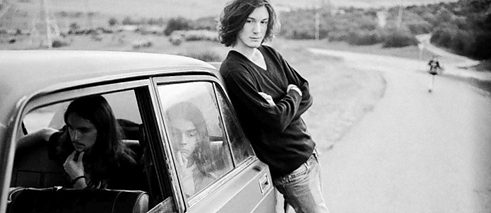Converter web portal
The Taste of Russulas

Punks sitting in the children’s room, bridal couples posing on Cosmonaut Square, the long drawn-out cry of the milkmen, slugs in the shower and Nick Cave in the Karelian underground. Goethe’s new web portal Converter is about small stuff like this. Small stuff like life.
Sometimes you just have to travel to Japan to really feel Tashkent, like Ashot Danielyan did. Well, he is an Uzbek, which simplifies matters quite a bit, and yet it is while he is in a “tiny room for foreign students,” two hundred kilometres from Tokyo that he is suddenly hit by a longing. Danielyan is sitting in his dorm room in front of the television when he accidentally channel surfs to a show dating from the 1980s teaching Russian to the Japanese. He is watching a Russian couple from Moscow that invited a student from Riga to their dacha to look for a certain type of mushroom in the forest: russulas or, in Russian, syroyezhki.
That is when it, the longing, hits the translator and author. The longing for russulas, which he has never even tasted before. The longing for conversations in his own language, which he has not spoken for long, say, about Murakami and the Nobel Prize, or to stroll through the broad avenues of Tashkent and to talk with friends about how wonderful life would be in Japan... All that because of the syroyezhki.
How do you live? This self-observation from Japan is one of billions of possible responses to this question and therefore is one of the mosaic pieces of the project Converter. Skateboarding in Almaty, mixtapes from Minsk or the longing of the foreign student in Japan for Tashkent: the Converter portal is about the real essentials of life. It’s about everyday, but not banal things, and about perspectives that are as different as can be.
Concrete, dust and steep ramps
Alexey Ulko is still there in Tashkent. A morning described by him in Converter does not taste like russulas. Concrete, dust, clattering freight trains from Kazakhstan, Soviet architecture and a plump mother in leopard-print leggings are the ingredients of his Tashkent story, augmented by the shouts of kefir sellers, the swifts circling overhead and the unknown neighbour thoughtfully drawing on his morning cigarette. It is a blend of melancholy and post-industrial idyll. “Even ten years ago, these buildings were homes mostly to the heavy drinking ex-workers of a long-closed machine factory,” Ulko writes. “But they either died out here or returned to their inhospitable homeland to die in some abandoned village outside of Kaluga.” This, too, is life.Converter is a place for stories and impressions from Eastern Europe and Central Asia. They are arranged alongside one another on the site with equal stature and largely uncategorized. There are three thematic categories for the blog-like contributions: How do you live?, Playlist and Skate-Spots. The first section contains – in words or pictures – stories about family life, stress in the dorm, neighbours on the street and what can be special locales and really unique places in the city. The Playlist serves up short mixtapes. Each playlist presents five songs by people who explain to us why they mean so much to them. The most specific section is Skate-Spots containing pictures of life on wheels. Where are the steepest ramps, where are the most laid-back spots for skateboarders in the city? Everything there is to know about the board that means the world to some people.
Every story, every photo gallery on Converter takes the portal’s visitors to another place in the Ukraine, to Uzbekistan, Russia, Georgia or Kazakhstan. The content remains, the formats are altered, which is why it is called Converter.
Or something like that
The editorial office for Converter itself is also changing. Presently located at the Goethe-Institut Novosibirsk, in two years it will move to a Goethe-Institut in another country – a new place, a new outlook, new formats. The portal is designed to never function one-dimensionally. Most Converter activities take place on social media and invite people to contribute.And now, lights out! Turn off your monitor, too. But first, click on the play button. Because, as Vova Potapenko recommends, the magic of the five pieces he chose can be sensed only in absolute darkness. One of them is an enchanting piece by French composer André Popp:
For Potapenko, a music teacher and musician from Minsk, the piece is associated with a special memory. For his first three years, he lived in a flat with a wireless connection in the kitchen that was known throughout the USSR. The evening weather forecast was always accompanied by Popp’s melody, which is why it is on a playlist together with UB40 and Edward Grieg.
In the meantime, in Tashkent, author Ulko has now boarded a taxi. “The driver hits the brakes when we approach a pedestrian crossing. I watch the preoccupied college students as they run for the opposite side of the road, and suddenly Bulgakov comes to mind: ‘The tom cats slinking around the veranda had a morning air about them. Groundhog day was irresistibly bearing down upon the poet.’ Or something like that.”
-db/fg-